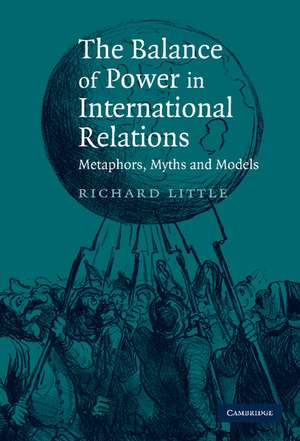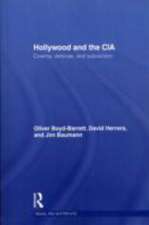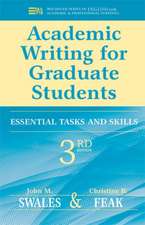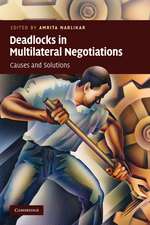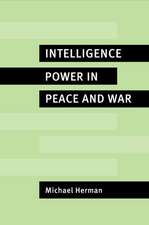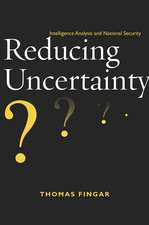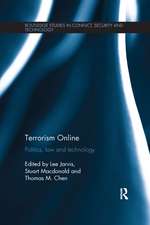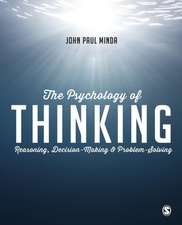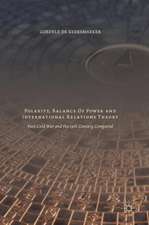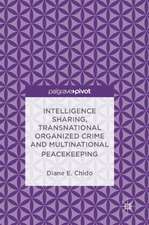The Balance of Power in International Relations: Metaphors, Myths and Models
Autor Richard Littleen Limba Engleză Hardback – 12 sep 2007
| Toate formatele și edițiile | Preț | Express |
|---|---|---|
| Paperback (1) | 281.59 lei 6-8 săpt. | |
| Cambridge University Press – 12 sep 2007 | 281.59 lei 6-8 săpt. | |
| Hardback (1) | 531.00 lei 6-8 săpt. | |
| Cambridge University Press – 12 sep 2007 | 531.00 lei 6-8 săpt. |
Preț: 531.00 lei
Preț vechi: 577.16 lei
-8% Nou
Puncte Express: 797
Preț estimativ în valută:
101.60€ • 106.08$ • 84.09£
101.60€ • 106.08$ • 84.09£
Carte tipărită la comandă
Livrare economică 05-19 aprilie
Preluare comenzi: 021 569.72.76
Specificații
ISBN-13: 9780521874885
ISBN-10: 0521874882
Pagini: 328
Ilustrații: 34 b/w illus.
Dimensiuni: 152 x 229 x 19 mm
Greutate: 0.64 kg
Ediția:New.
Editura: Cambridge University Press
Colecția Cambridge University Press
Locul publicării:Cambridge, United Kingdom
ISBN-10: 0521874882
Pagini: 328
Ilustrații: 34 b/w illus.
Dimensiuni: 152 x 229 x 19 mm
Greutate: 0.64 kg
Ediția:New.
Editura: Cambridge University Press
Colecția Cambridge University Press
Locul publicării:Cambridge, United Kingdom
Cuprins
Part I. Introduction: 1. Reassessing the balance of power; Part II. Metaphors, Myths and Models: 2. Metaphors and the balance of power; 3. The balance of power: from metaphors to myths and models; Part III. Balance of Power Models: 4. Hans J. Morgenthau's Politics among Nations; 5. Hedley Bull's The Anarchical Society; 6. Kenneth N. Waltz's Theory of International Politics; 7. John J. Mearsheimer's The Tragedy of Great Power Politics; Part IV. Conclusion: 8. A composite view of the balance of power for the twenty first century.
Recenzii
'Richard Little's study is set to be the definitive account of balance-of-power thinking within IR theory. He traces the role played by this idea in the work of Morgenthau, Bull, Waltz, and Mearsheimer, and manages to treat them all with remarkable freshness and originality. This book yields many new insights into a topic that continues to fascinate the IR mind, despite the many times its death has been foretold.' Ian Clark, Professor of International Politics, University of Wales Aberystwyth
'Now that academic international relations is emerging out of a metathoretical detour, the balance of power is set to regain a prominent place in the discipline. At the same time, the so-called unipolar moment has generated widespread interest among various political actors as to the merits of balancing behaviour. Richard Little's new book will appeal to both academics and practitioners. In the first half, the author brings analytical precision to the concept and in the second half he engages with a fascinating dialogue with leading theoreticians of the balance of power. The result is an original and timely appraisal of one of the discipline's founding concepts. Tim Dunne, Head of Politics, University of Exeter
'Little's book about the 'balance of power' has two great virtues: it treats that time-honored concept with respect and sophistication, while offering critical analysis along the way. Moreover, it nicely shows the clear differences among realist thinkers who employ that concept in their theories.' John J. Mearsheimer, R. Wendell Harrison Distinguished Service Professor of Political Science, University of Chicago
'Every diplomat and every scholar fancies him or herself an expert on the balance of power. In this lucid, informative and provocative book, Richard Little proves them all wrong. With sophisticated theoretical reasoning, careful and novel interpretations of canonical texts, and wide-ranging historical analysis, Little provides a fresh analysis of a central but elusive concept. A landmark study of the balance of power and international relations theory.' William C. Wohlforth, Professor & Chair, Department of Government, Dartmouth College
'… a valuable contribution …' Political Studies Review
'Now that academic international relations is emerging out of a metathoretical detour, the balance of power is set to regain a prominent place in the discipline. At the same time, the so-called unipolar moment has generated widespread interest among various political actors as to the merits of balancing behaviour. Richard Little's new book will appeal to both academics and practitioners. In the first half, the author brings analytical precision to the concept and in the second half he engages with a fascinating dialogue with leading theoreticians of the balance of power. The result is an original and timely appraisal of one of the discipline's founding concepts. Tim Dunne, Head of Politics, University of Exeter
'Little's book about the 'balance of power' has two great virtues: it treats that time-honored concept with respect and sophistication, while offering critical analysis along the way. Moreover, it nicely shows the clear differences among realist thinkers who employ that concept in their theories.' John J. Mearsheimer, R. Wendell Harrison Distinguished Service Professor of Political Science, University of Chicago
'Every diplomat and every scholar fancies him or herself an expert on the balance of power. In this lucid, informative and provocative book, Richard Little proves them all wrong. With sophisticated theoretical reasoning, careful and novel interpretations of canonical texts, and wide-ranging historical analysis, Little provides a fresh analysis of a central but elusive concept. A landmark study of the balance of power and international relations theory.' William C. Wohlforth, Professor & Chair, Department of Government, Dartmouth College
'… a valuable contribution …' Political Studies Review
Descriere
An authoritative 2007 analysis of the concept of the balance of power in international relations.
